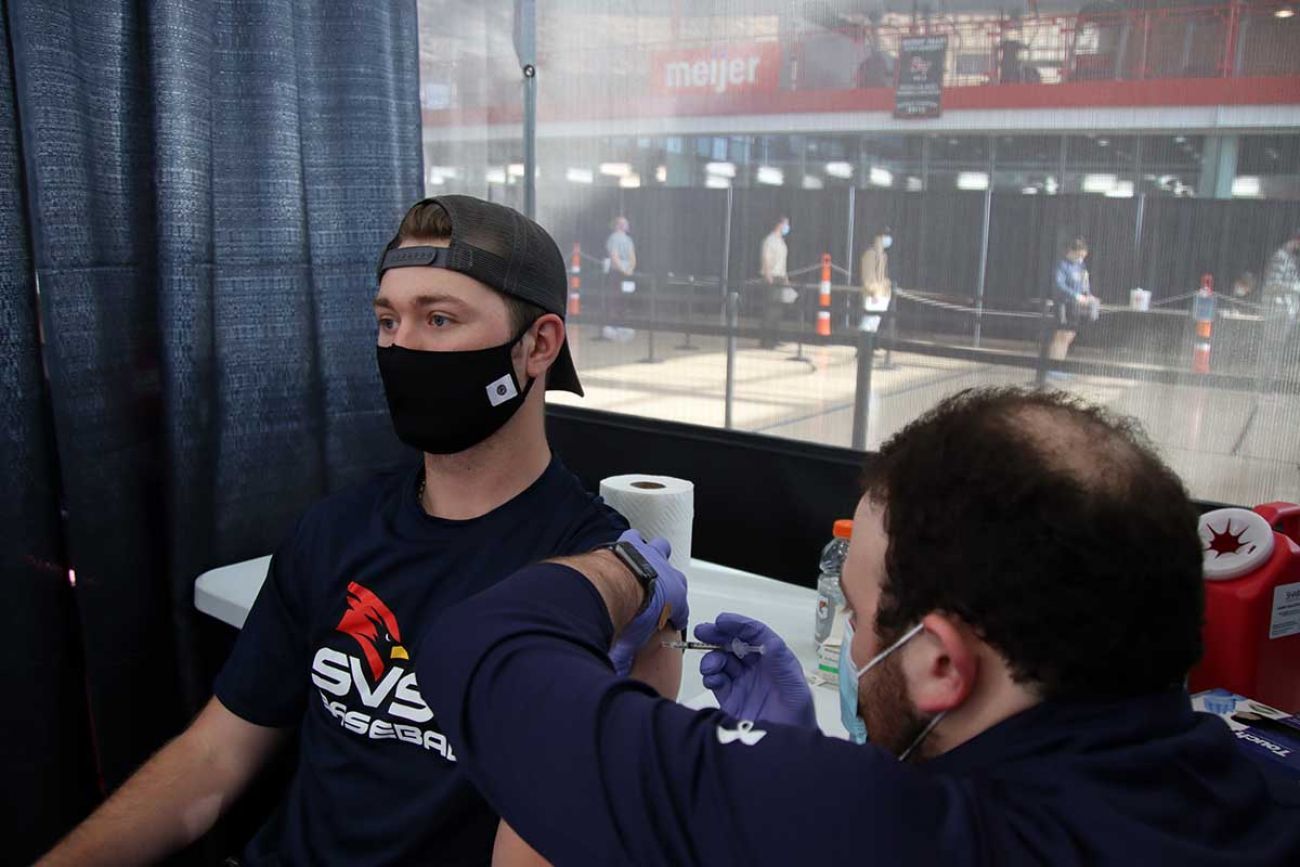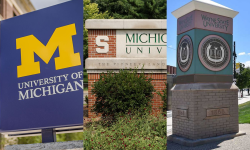Michigan colleges battle omicron with mandates, caution amid a better year

More than a year after Michigan colleges were pummeled by COVID-19 outbreaks, schools continue to tinker with measures to try to sidestep the most contagious COVID-19 variant yet.
Oakland University, Wayne State University, Eastern Michigan University and Michigan State University recently announced they will start their semesters online in hopes of decreasing person-to-person contact.
“Starting the semester remotely and de-densifying campus in the coming weeks can be a solution to slowing the spread of the virus,” MSU President Samuel Stanley wrote to students and staff about the temporary move to remote learning.
Related:
- Michigan kids ages 12 to 15 now poised to be eligible for COVID boosters
- Fewer masks, more illness, mass confusion as Michigan schools face omicron
- Can at-home COVID tests be trusted with omicron? There are limits.
- Michigan businesses fear crippling staff shortages as omicron spreads
Over the holidays, MSU and the University of Michigan-Ann Arbor instituted a vaccination-or-test policy to enter indoor sporting events, where all fans will be masked. Fans must show proof of vaccination or proof of a negative COVID test taken within the past 72 hours.
Students and employees at MSU, Wayne State, and the U-M campuses in Ann Arbor, Dearborn and Flint also must get COVID booster shots in the coming weeks or face possible disciplinary action. At Western Michigan University, students will now be required to have a booster shot or be tested regularly.
“We expect these first few weeks of the semester to be challenging and ask everyone to care for yourselves and for one another by staying safe and practicing kindness during what will be a stressful time for many,” U-M President Mark Schlissel and Provost Susan Collins wrote to students in a letter announcing the changes. “Cases are very likely to increase, regardless of decisions we make about in-person work or classes.”
It’ll be weeks before it's known how successful those efforts are, but Michigan colleges and universities have been remarkably successful so far this school year at keeping COVID at bay.
“In many cases, the positivity rate has been very low on campuses and considerably higher in their surrounding communities,” said Dan Hurley, CEO of the Michigan Association of Public Universities, which represents the state’s 15 public universities.
That’s a big change from the fall of 2020, the first college semester to begin during the pandemic.
Then, many Michigan colleges were scenes of large coronavirus outbreaks, leading to public-health emergencies and campus-wide quarantines of tens of thousands of students in East Lansing and Ann Arbor. MSU closed most of its dorm rooms for fall 2020 and virtually all classes at many colleges and universities were held online.
By this past fall, though, college campuses were comparatively safe, with vaccine and mask mandates leading to COVID case rates lower than the communities surrounding them. Several universities instituted vaccine mandates for the fall, and others mandated strict COVID testing regimens.
More than nine in 10 students and staff were vaccinated at some campuses, including the University of Michigan and Michigan State University. By comparison, statewide, 47 percent of residents age 16-19 are fully vaccinated, and 45 percent age 20-29.
The low campus infection rate this fall was mostly before the highly contagious omicron variant began wreaking havoc across the state. With students now returning to campus after several holiday weeks off, some university testing is already indicating a rise in COVID cases.
There were 258 newly confirmed coronavirus cases at MSU in the week ending Dec. 27, the latest data available through the university. That’s triple the number of cases identified the previous week, and 77 percent higher than the previous weekly high this school year, which was 146 in the week ending Sept. 6.
At the University of Michigan in Ann Arbor, there were 596 cases identified in the week ending Jan. 1; the previous high for the school year had been the week before, at 355.
Figures for both U-M and MSU are from time periods when most students hadn’t returned to campus.
The omicron variant has caused relatively mild symptoms for most people who are vaccinated. Still, those who test positive must quarantine for a minimum of five days. At most colleges, students who live in residence halls who contract COVID are segregated.
Oakland University has a vaccination rate of 83 percent for students taking at least one class on campus and 97 percent among full-time faculty, but still began the semester Wednesday with fully remote classes due to omicron. Classes will remain remote until Jan. 18.
“We put a lot of thought into this when it (the surge) happened,” said Oakland spokesperson Brian Bierley. “Having a president who is a physician (Dr. Ora Hirsch Pescovitz) helps, because they have a unique insight.”
“Every institution was a little (like a) deer in the headlights in 2020,” said Hurley, of the statewide university association. “Changes in the pandemic are not as jarring as they were.”
Michigan Education Watch
Michigan Education Watch is made possible by generous financial support from:
Subscribe to Michigan Health Watch
See what new members are saying about why they donated to Bridge Michigan:
- “In order for this information to be accurate and unbiased it must be underwritten by its readers, not by special interests.” - Larry S.
- “Not many other media sources report on the topics Bridge does.” - Susan B.
- “Your journalism is outstanding and rare these days.” - Mark S.
If you want to ensure the future of nonpartisan, nonprofit Michigan journalism, please become a member today. You, too, will be asked why you donated and maybe we'll feature your quote next time!





